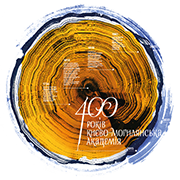News
A European revolution in Ukraine
- Details
- Published on Thursday, 13 March 2014 14:20
A new publication at University World News by Serhiy Kvit, NaUKMA President and newly appointed Minister of Science and Education
Terms like Maidan, Euromaidan and Eurorevolution have been used in connection with what has happened in Ukraine. But for me European Revolution better describes the tectonic faults in Ukrainian public consciousness that have happened in the last weeks.
Only three months ago, the power of former president Viktor Yanukovych seemed strong and irreversible. He controlled and exploited all of Ukraine's resources; the military forces, fleet, aviation and police were under his command.
Journalists and students who declared their desire to live in a united Europe, sharing its values and professional standards, seemed very naive.
The people's anger on 19 February was whipped up to the maximum. The government started shooting its citizens. Here is the statement of the Kyiv-Mohyla Academy regarding the events of those days:
"The bloody events of February 18-19 have moved Viktor Yanukovych's regime to a position outside of the law. Ukraine's authorities have begun a war against their own people, who have been defending their dignity and their rights. Therefore, we call on:
- Our compatriots - to stop the fratricide and bloodshed.
- Police authorities - not to comply with criminal orders, and to remember the oath of enlistment they made to the people of Ukraine.
- Ukrainian officers - to recall their honour and dignity and to protect the lives of their compatriots, the sovereignty of Ukraine, and to defend the Ukrainian people from the onslaught of dictatorship.
- University academic communities - to stop the study process until the bloodshed is over.
Glory to Ukraine!"
A similar position was declared by the Ivan Franko National University of Lviv, the Ukrainian Catholic University and the Borys Hrinchenko Pedagogical University of Kyiv. In fact, the European Revolution was supported by the whole Ukrainian academic community.
Today it is hard to explain to a foreign reader the measure of determination in Ukrainian society, a determination that allows no hope for tyrants.
The day before that offensive, citizens of Kyiv - including students, professors and pensioners - were preparing Molotov cocktails, breaking paving bricks to build barriers, providing food to protesters and healing their wounds.
The previous day, special units of the army and police forced protesters back from their settled positions and burnt the House of Trade Unions, where the headquarters of Euromaidan was located. In street battles, several combat vehicles were burnt when trying to destroy the barricades.
Then, 20 February became the day of victory for Euromaidan.
Protesters were armed mostly with shields, hand-made or seized from police, sticks, army or miners' helmets, and a negligible number of firearms. They moved against armed special units of police; they were shot by snipers but kept moving ahead.
And the government flinched.
First, police began leaving their posts. In a couple of days, Yanukovych escaped and he was followed by other representatives of the corrupt government, including the infamous former minister of education and science Dmytro Tabachnyk.
It looked like a Biblical miracle, a victory of strong-in-spirit people struggling for Good and Truth. The number of those who died reached 100 two weeks after those events. People called those heroes 'The Heaven Troop'.
Blockading the ministry
Students were an extremely important part of the European Revolution and it was quite expected that they would get directly involved in reforming education. On 21 February, student activists blocked the Ministry of Science and Education and ministry officials had to leave their offices.
In the blocked building, students organised a daily protest modelled on what happened at Maidan and prepared to keep the blockade going for as long as necessary - until the appointment of new administrators in the education field could be made and their demands could be met.
Order and discipline was kept in the blocked building. All the offices were sealed. Nothing was stolen or destroyed during the weeks of 'student administration' there. Candidates for the position of education minister arrived at the blocked ministry for talks with students.
It was a unique situation.
The three-year-long struggle of the Ukrainian academic community against policies aimed at degrading science and education ended with students taking charge. Students wrote a 'road map' of demands, which were headed by issues of democratisation, transparency, accountability and new professional standards.
New politics in education
It so happened that I was appointed to the position of Minister of Education and Science in the 'government of national confidence'. We all understand that it is not a good moment for high-sounding words and that we probably have a very short time for productive work.
The state treasury was totally ransacked by Viktor Yanukovych and other criminals, now internationally wanted. The Russian Federation has begun aggression on Ukraine's territory.
Vladimir Putin understands very well that the Ukrainian European Revolution does not threaten Russia or Russians, as he states, but that it does threaten his authoritarian regime. He is trying to support the 'greatness' of the Russian Empire by discreditable actions of occupation and deceitful propaganda, which are worthy of Dr Goebbels' memory.
Under such conditions, the renewed Ministry of Education and Science declared the first of its new policies.
Among them are integration into the common European area of higher education, implementation of university autonomy, passing of the new Law on Higher Education, refusal to submit to ministry control and repression, partner relations between the ministry and universities, financial transparency and accountability.
A special role is to be played in the revolution by the academic community, public organisations and independent experts. The main task of the ministry is to implement systemic reforms that will lead to an improvement of quality of Ukrainian education.
From now on, then, my blog will be handed over to one of the leading experts on education in Ukraine, Yegor Stadny.
